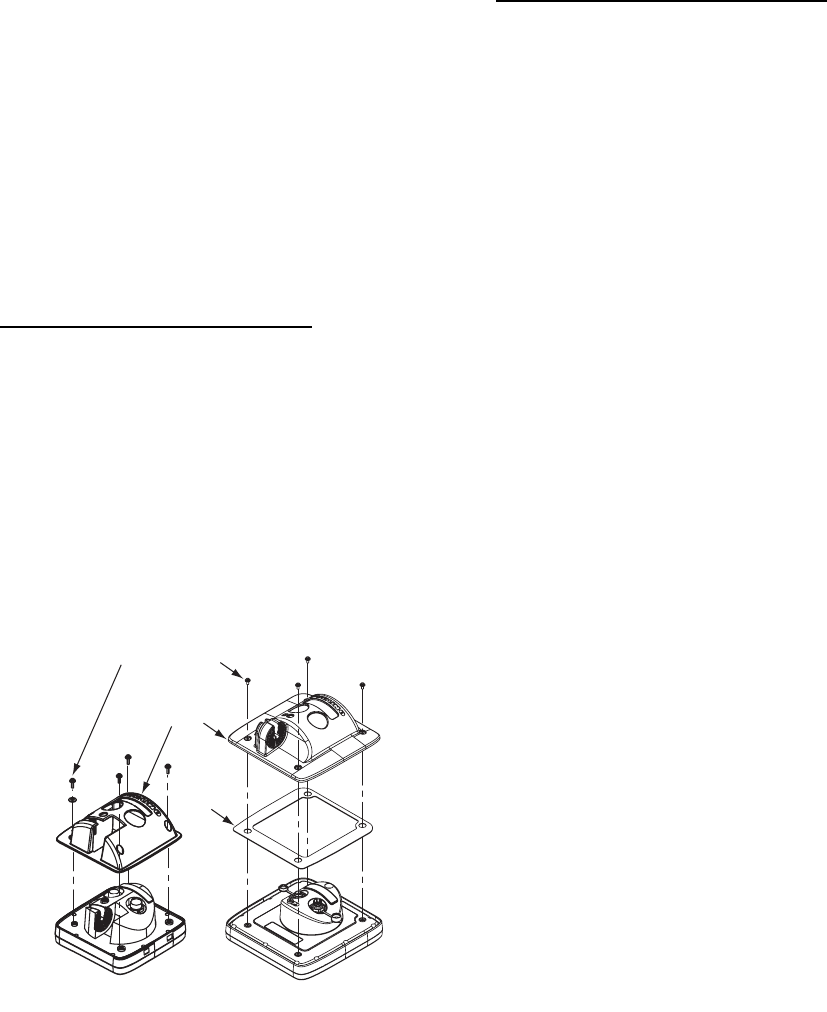
4. INSTALLATION
34
2. Fix the bracket assembly to a desktop
with four self-tapping screws (5×25, sup-
plied).
Be sure to follow the recommended main-
tenance space show in the outline draw-
ing. Insufficient space may cause
damage to connectors when disconnect-
ing and reconnecting them.
3. Loosely screw knob into the bracket as-
sembly.
4. Set the display unit to the bracket assem-
bly.
5. Adjust the angle of the display unit and
then tighten the knob to fix the display
unit.
Note: When loosening the knob to adjust
the angle of the display, do not tilt the unit
90-degree backward or forward. The ca-
ble connector may be damaged if it con-
tacts the bracket.
6. Attach the hard cover to the display unit
for protection when the unit is not in use.
Flush mounting in a console
It is recommended to set up a dedicated
breaker when flush mounting the unit, since it
will be difficult to disconnect cables.
1. Using the paper template (supplied),
make a cutout in the mounting location.
2. Unfasten four washer head screws on the
rear of the display unit to remove the
bracket cover and the cover sponge
(FCV-587 only).
3. Set the flush mounting sponge (supplied)
to the display unit.
4. Screw four threaded rods (supplied) to
the display unit.
5. Set the display unit to the cutout.
6. Fasten the display unit from behind with
four sets of flat washers, spring washers
and wing nuts (supplied).
4.3 Thru-hull Mount
Transducer
Transducer mounting location
The thru-hull mount transducer provides the
best performance of all, since the transducer
protrudes from the hull and the effect of air
bubbles and turbulence near the hull skin is
reduced. When the boat has a keel, the trans-
ducer should be at least 30 cm away from it.
The performance of this fish finder is directly
related to the mounting location of the trans-
ducer, especially for high-speed cruising. The
installation should be planned in advance,
keeping the length of the transducer cable
and the following factors in mind:
• Air bubbles and turbulence caused by
movement of the boat seriously degrade
the sounding capability of the transducer.
The transducer should, therefore, be locat-
ed in a position where water flow is the
smoothest. Noise from the propellers also
adversely affects performance and the
transducer should not be mounted nearby.
The lifting strakes are notorious for creating
acoustic noise, and these must be avoided
by keeping the transducer inboard of them.
• The transducer must always remain sub-
merged, even when the boat is rolling,
pitching or up on a plane at high speed.
• A practical choice would be somewhere be-
tween 1/3 and 1/2 of the boat's length from
the stern. For planing hulls, a practical loca-
tion is generally rather far astern, so that
the transducer is always in water regard-
less of the planing attitude.
FCV-627 FCV-587
Washer head screw
Bracket cover
Cover
sponge


















